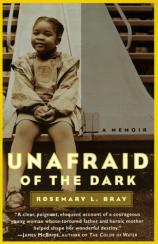Reading Group Guide
Discussion Questions
Unafraid of the Dark

1.The author writes, "My mother's endurance was a mystery to me....[W]hat I never understood was how she was able to do what she did for as long as she did it." (p. 10) In what ways does she have a better understanding of her mother's endurance by the end of the memoir?
2.Talk about the author's point that one of the basic flaws in ADC was that it wasn't designed originally as a permanent social insurance program like Social Security. Do you agree or disagree? And why?
3. The author notes that her mother and other African-American women of that generation felt their lives were less important than the lives of the children they raised. Is this a truth that still exists today? That transcends economic and racial barriers?
4. The author's father beat her and terrorized her family. He also encouraged, demanded, and instilled a love and respect for books and learning. If the reverse were true (a loving father who had no respect for learning) how might her life have been different? Do you think she would have accomplished what she has?
5. Welfare made the author's father a "shadow man." Talk about this phenomenon and what it does to men and to their families.
6. Talk about the changes that occur in the author's perceptions and understanding of her home and neighborhood every time she ventures farther from it.
7. Is the author more like her father than not? In what ways?
8. How can a teacher change a student's life? How did her teacher at Francis W. Parker School do that for the author? Talk about experiences you've had with an inspirational teacher.
9. Talk about Dr. Martin Luther King, Jr.--the author's perceptions of him and her understanding of the movement for racial equality and how it changed at different points in her life. Can you chart such points in your life?
10. The author writes that she learned to "negotiate a way of belonging in this largely white, culturally very different world without abandoning the rest of my real life." (p. 106) What price does she pay for doing this? Is there a choice for African-Americans? Do white people ever have to do the same?
11. Diversity and integration? Or, separatism and co-existence? At what points in the book does the author feel one way or the other is best?
12. Talk about the author's pragmatism regarding affirmative action. Talk about the current state of affirmative action--the arguments for and against it.
13. When the author enters the workforce, she has to deal with a whole new breed of problem--an unsupportive boss. Talk about this as a reality of life. Is it worse, or more common, for African-Americans?
14. Free of her husband, her children grown, the author's mother chooses to be a companion and helper to a wealthy white woman. How does the author come to terms with this? How would you?
15. Talk about the author's relationship with Royce in Harlem. Would you have helped in the same way?
16. Talk about the difference between the world of men and the world of women. In the African-American community, who pays a bigger price for day-to-day existence? For achieving dreams?
17. Talk about Evangelical Christianity as a faith that leads Christians "not to a larger embrace of the world...but to a profound sense of hopelessness.... Their great love of God had ruined them in the company of humanity." (p. 262)
18. The author considers "color-blindness in America both an insult and a lie." (p. 263) Do you agree? Why or why not?
19. The author notes that Shelby Steele argues for forgetting and forgiveness in regard to racial issues. The author argues that "consciousness is the only path to forgiveness and reconciliation." (p. 268) What do you think?
20. Talk about the welfare reform bill of 1996. Do you agree with the author that it is a "betrayal of our interests as women." (p. 274) Have your feelings about this been influenced by reading this memoir or from your personal experience with welfare?
Unafraid of the Dark
- Publication Date: March 16, 1999
- Paperback: 304 pages
- Publisher: Anchor
- ISBN-10: 0385494750
- ISBN-13: 9780385494755






